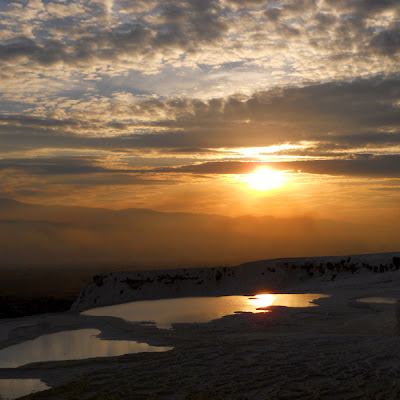L' antica città di Ierapoli fu probabilmente fondata da Eumene ll, re di Pergamo, nel 11 sec. A.C. Si suppone che il nome della città derivi da Iera, moglie di Telefo, antenati leggendari dei re di Pergamo.

Il nome di Ierapoli fu interpretato da alcuni anche come "città sacra". Tutte le rovine della città, tranne le fondamenta del tempio di Apollo, risalgono al'epoca romana imperiale.

Le terrazze di Pamukkale si sono formate naturalmente grazie all' acqua calda ricca di bicarbonato di calcio che scorre nella zona ad una tempura di 35gradi. Quando di biossido di carbonio, presente nel bicarbonato, a causa di una reazione chimica, si libera, deposita carbonato di calcio sul fondo dell'acqua. Questi depositi prendono diversi colori e forma oltre alle vasche, formano cascate e stalattiti. Una città ellenistico-romana della Frigia "Pamukkale", che in turco significa "Castello di Cottone" prende il suo nome da quente formazioni.















With its white and clean therapeutic calcium terraces "travertine pools" and natural geological wonder, "Cotton Castle", as we say in turkish Pamukkale is on the plateau at the top of ruins of the ancient Roman Bath Town Hierapolis. Very unique in the world and preserved by UNESCO Heritage. This area that blessed city Denizli in southwestern Turkey inspires many people tourists to artists coming to the warm spring waters that bubble to the surface that was a source of life for Hierapolis, one of the most prominent health centers of antiquity. Have to say, the average age visiting the region was, naturally, 115:) Tourists were coming mostly from the States, and following them France, Germany and Japan.
You can SWIM here, all year around, even in SNOW, and highly recommended not to leave without having a bath in the sacred pools where both Romans and Greeks that enjoyed historically! We stayed in Pam Thermal Hotel, in Karahayit, famous as a health center complex. Late evening I liked very much swimming in the healing powers of its minerals in red water that our Hotel provides (below). Amazing experience, love it!


Il nome di Ierapoli fu interpretato da alcuni anche come "città sacra". Tutte le rovine della città, tranne le fondamenta del tempio di Apollo, risalgono al'epoca romana imperiale.

Le terrazze di Pamukkale si sono formate naturalmente grazie all' acqua calda ricca di bicarbonato di calcio che scorre nella zona ad una tempura di 35gradi. Quando di biossido di carbonio, presente nel bicarbonato, a causa di una reazione chimica, si libera, deposita carbonato di calcio sul fondo dell'acqua. Questi depositi prendono diversi colori e forma oltre alle vasche, formano cascate e stalattiti. Una città ellenistico-romana della Frigia "Pamukkale", che in turco significa "Castello di Cottone" prende il suo nome da quente formazioni.















With its white and clean therapeutic calcium terraces "travertine pools" and natural geological wonder, "Cotton Castle", as we say in turkish Pamukkale is on the plateau at the top of ruins of the ancient Roman Bath Town Hierapolis. Very unique in the world and preserved by UNESCO Heritage. This area that blessed city Denizli in southwestern Turkey inspires many people tourists to artists coming to the warm spring waters that bubble to the surface that was a source of life for Hierapolis, one of the most prominent health centers of antiquity. Have to say, the average age visiting the region was, naturally, 115:) Tourists were coming mostly from the States, and following them France, Germany and Japan.
You can SWIM here, all year around, even in SNOW, and highly recommended not to leave without having a bath in the sacred pools where both Romans and Greeks that enjoyed historically! We stayed in Pam Thermal Hotel, in Karahayit, famous as a health center complex. Late evening I liked very much swimming in the healing powers of its minerals in red water that our Hotel provides (below). Amazing experience, love it!

Please click on my photos for larger size and
learn more about it:
learn more about it:











We have some natural thermal bathes in our region but nothing as beautiful as these.
ReplyDeleteI've (unfortunately) nver been to Pamukkale yet, but we got a postcard today from a good friend who spent some relaxing days at Bodrum...
ReplyDelete@ Uwe: "The land of eternal blue" Bodrum is an excellent place to explore. Did you know Pamukkale is ~285 km drive from Bodrum on the coast of Aegean Sea?! Come to discover both of them:)
ReplyDeleteCiao, sono contenta dei tuoi saluti, che ricambio. Il post è bellissimo, sia le immagini, sia i tramonti favolosi..una città da visitare!!Un caro saluto da Torino, buon fine settimana:-)
ReplyDelete